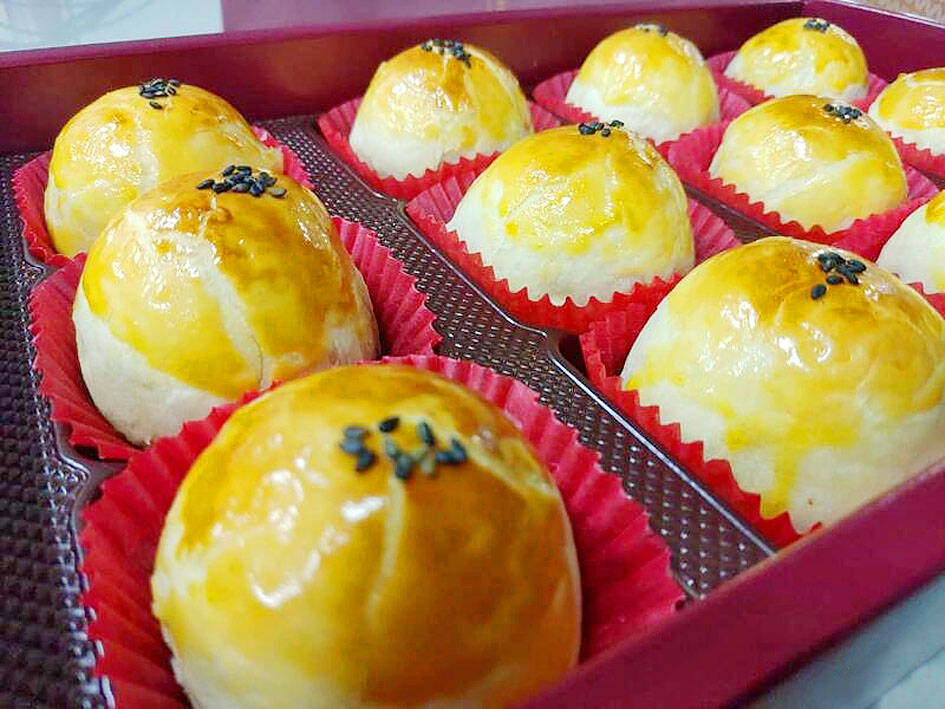Traditional mooncakes are a typical treat for many Taiwanese in the lead-up to the Mid-Autumn Festival, but a Taipei-based dietitian has urged people not to eat more than one per day and not to have them every day due to their high fat and calorie content.
As mooncakes contain a lot of oil and sugar, they can have negative health effects on older people and those with diabetes, said Lai Yu-han (賴俞含), a dietitian at Taipei Hospital of the Ministry of Health and Welfare.
“The maximum you can have is one mooncake a day, and do not eat them every day,” Lai said in a recent statement.

Photo: Taipei Times file
While it is good that many people are increasingly aware of how to eat well and look at the nutrition information labels on food, they should still be careful around the holidays, she said.
Many kinds of mooncakes are available in stores around the Mid-Autumn Festival, including Cantonese-style, Suzhou-style and Taiwanese-style mooncakes.
Cantonese-style mooncakes have more layers than other kinds and contain more oil, making them unhealthier, Lai said.
Bakers also tend to use a large amount of sugar to make the filling sweeter, meaning people are likely to consume a lot of calories without noticing, she said.
A traditional Cantonese-style white lotus seed paste mooncake made with two yolks contains about 810 calories, she said, adding that a person would need to jog around a 400m track 33 times to burn them off.
“A better way to eat a mooncake is to cut it into pieces and share it with your friends,” she said. “Remember, reducing the amount you eat is critical to your health.”
On the day a person eats a mooncake, they should reduce the amount of rice they consume by half, Lai said.
She recommended “snow skin” or “ice skin” mooncakes as healthier options.
These mooncakes are made with glutinous rice skin and are stored at low temperatures.
They contain relatively few calories, Lai said.
Everyone should monitor their sugar levels when they eat mooncakes to avoid a spike in blood sugar and stay alert to possible poor digestion or gastroenteritis, she added.

TRAFFIC SAFETY RULES: A positive result in a drug test would result in a two-year license suspension for the driver and vehicle, and a fine of up to NT$180,000 The Ministry of Transportation and Communications is to authorize police to conduct roadside saliva tests by the end of the year to deter people from driving while under the influence of narcotics, it said yesterday. The ministry last month unveiled a draft of amended regulations governing traffic safety rules and penalties, which included provisions empowering police to conduct mandatory saliva tests on drivers. While currently rules authorize police to use oral fluid testing kits for signs of drug use, they do not establish penalties for noncompliance or operating procedures for officers to follow, the ministry said. The proposed changes to the regulations require

Taipei, New Taipei City, Keelung and Taoyuan would issue a decision at 8pm on whether to cancel work and school tomorrow due to forecasted heavy rain, Keelung Mayor Hsieh Kuo-liang (謝國樑) said today. Hsieh told reporters that absent some pressing reason, the four northern cities would announce the decision jointly at 8pm. Keelung is expected to receive between 300mm and 490mm of rain in the period from 2pm today through 2pm tomorrow, Central Weather Administration data showed. Keelung City Government regulations stipulate that school and work can be canceled if rain totals in mountainous or low-elevation areas are forecast to exceed 350mm in

1.4nm WAFERS: While TSMC is gearing up to expand its overseas production, it would also continue to invest in Taiwan, company chairman and CEO C.C. Wei said Taiwan Semiconductor Manufacturing Co (TSMC) has applied for permission to construct a new plant in the Central Taiwan Science Park (中部科學園區), which it would use for the production of new high-speed wafers, the National Science and Technology Council said yesterday. The council, which supervises three major science parks in Taiwan, confirmed that the Central Taiwan Science Park Bureau had received an application on Friday from TSMC, the world’s largest contract chipmaker, to commence work on the new A14 fab. A14 technology, a 1.4 nanometer (nm) process, is designed to drive artificial intelligence transformation by enabling faster computing and greater power

China Airlines Ltd (CAL) yesterday morning joined SkyTeam’s Aviation Challenge for the fourth time, operating a demonstration flight for “net zero carbon emissions” from Taiwan Taoyuan International Airport to Bangkok. The flight used sustainable aviation fuel (SAF) at a ratio of up to 40 percent, the highest proportion CAL has achieved to date, the nation’s largest carrier said. Since April, SAF has become available to Taiwanese international carriers at Taipei International Airport (Songshan airport), Kaohsiung International Airport and Taoyuan airport. In previous challenges, CAL operated “net zero carbon emission flights” to Singapore and Japan. At a ceremony at Taoyuan airport, China Airlines chief sustainability